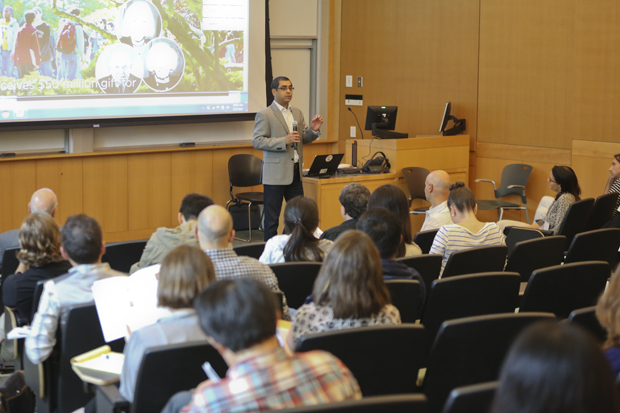Some good news about the job prospects of PhD students
At the HackMyPhD event, speakers offered advice and personal perspectives on pursuing a career outside academia.
 Photo: Mike Lovett
Photo: Mike LovettVipin Suri talks about his experience in the biotechnology industry.
Attention PhD students worried about their careers — there’s hope.
This was the take-home message of HackMyPhD, a one-day professional development conference for graduate students and postdoctoral fellows in the so-called STEAM fields (science, technology, engineering, math and art and design). Despite the scarcity of jobs in academia, the event’s speakers said there were still plenty of rewarding and exciting careers open to PhDs in the for-profit, government and nonprofit sectors.
Jessica Liebowitz, a visiting scholar at Brandeis who studies doctoral education, delivered opening remarks. The number of PhD students in the United States in all the academic disciplines rose from 10,000 in the 1950s to 55,000 in 2015, she said. Meanwhile, the number of tenured academic posts in these fields has dropped dramatically relative to the number of part-time adjunct and non-tenured positions. Only about 13 percent of PhD students now go on to work in academia upon competing their degrees.
“This is not to say that doctoral students are not getting jobs” said Liebowitz. Overall, she said, PhDs enjoy one of the lowest unemployment rates in the labor market.
She urged audience members to be energetic and creative about charting their professional futures, asking themselves, “What might it mean for me to design a career or a project that allows me to harness my passions, my talents and my training to generate my best work?”
In her remarks, Provost Lisa Lynch said educational institutions are “reconsidering the whole notion of what it means to have a PhD.” She said that PhDs today need to think about their career as lifelong, self-directed and involving work at a range of institutions. “It’s hugely exciting to think about having experiences in academia, in the private sector, in the government sector and as an entrepreneur,” Lynch said. Graduate students, she said, need to think about “taking [their] knowledge and using it to improve the world in one way or another which may not be a ‘traditional’ academic position.”
Other speakers included PhDs who’ve gone on to careers outside academia. Here’s a sampling of their advice:
Eyal Ron, PhD’88, chief technology officer, Gelesis
“Be a self-starter. I started my career many times ... You can wear many hats in your career.”
“Don’t be afraid. Move along.”
“Find a mentor ... You just see how they behave in their position and you say, ‘Ah-hah, this is the person I want to be in 5 to 10 years,’ then you try to mimic them.”
Vipin Suri, PhD’01, vice president of discovery, Obsidian Therapeutics
“It’s important to recognize what drives you.”
“In a start-up, the sooner you kill [a bad idea], the better. Time is very expensive.”
Craig Stropkay, PhD’13, director and life-science consultant, KOLgroups
“You expect one thing, something else happens.”
“It’s the way you react to failure that ultimately drives whether you succeed.”
Rebecca Menapace, associate provost for innovation and executive director of the Office of Technology Licensing, Brandeis University
“This is your journey. It’s not more important to anyone than you. You really need to do that self-exploration as to what interests you and what you see on your horizon.”
Categories: Alumni, Science and Technology, Student Life





